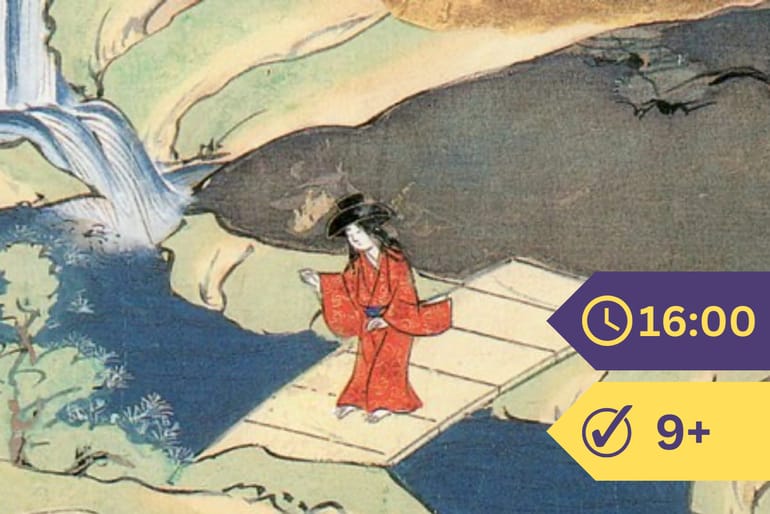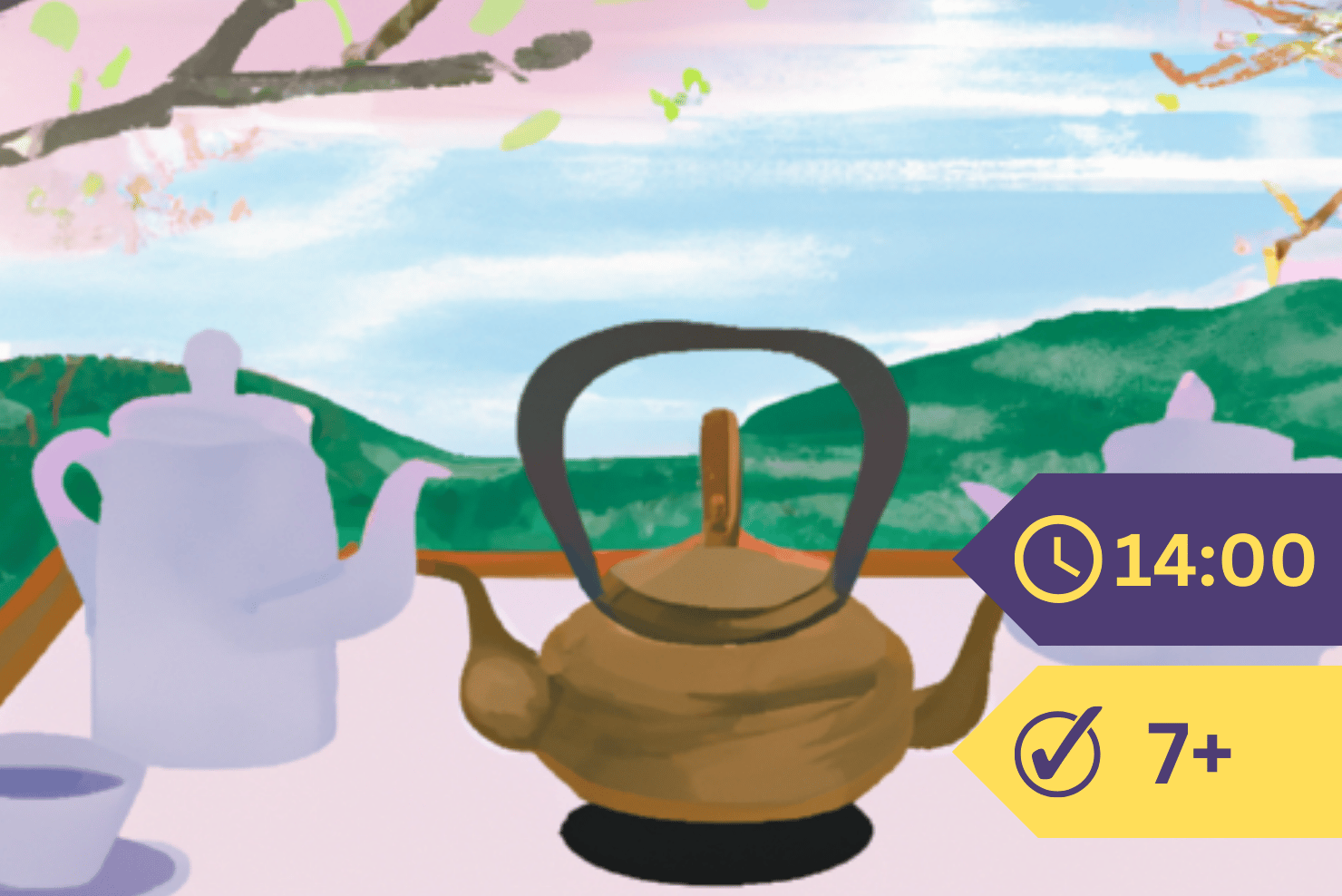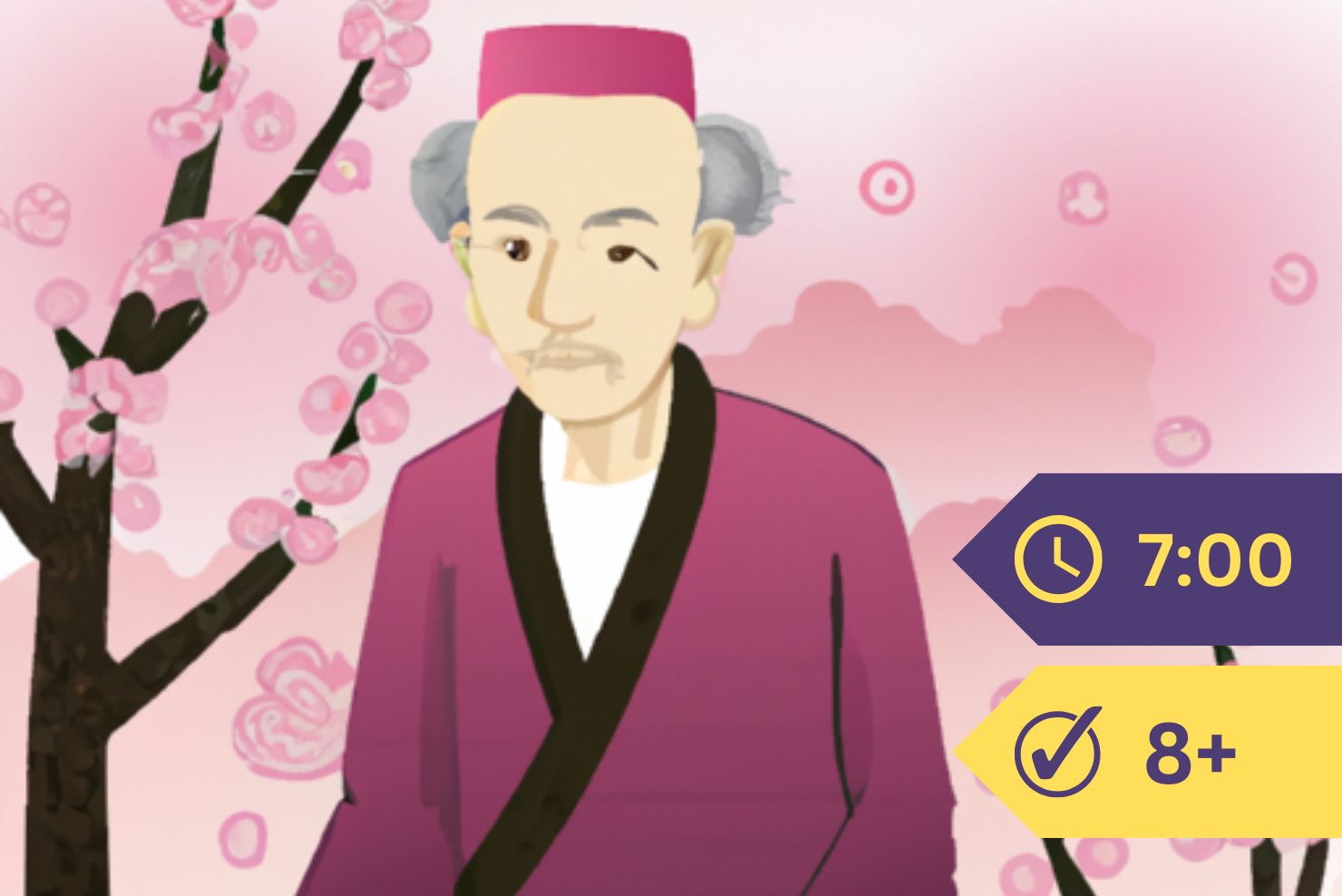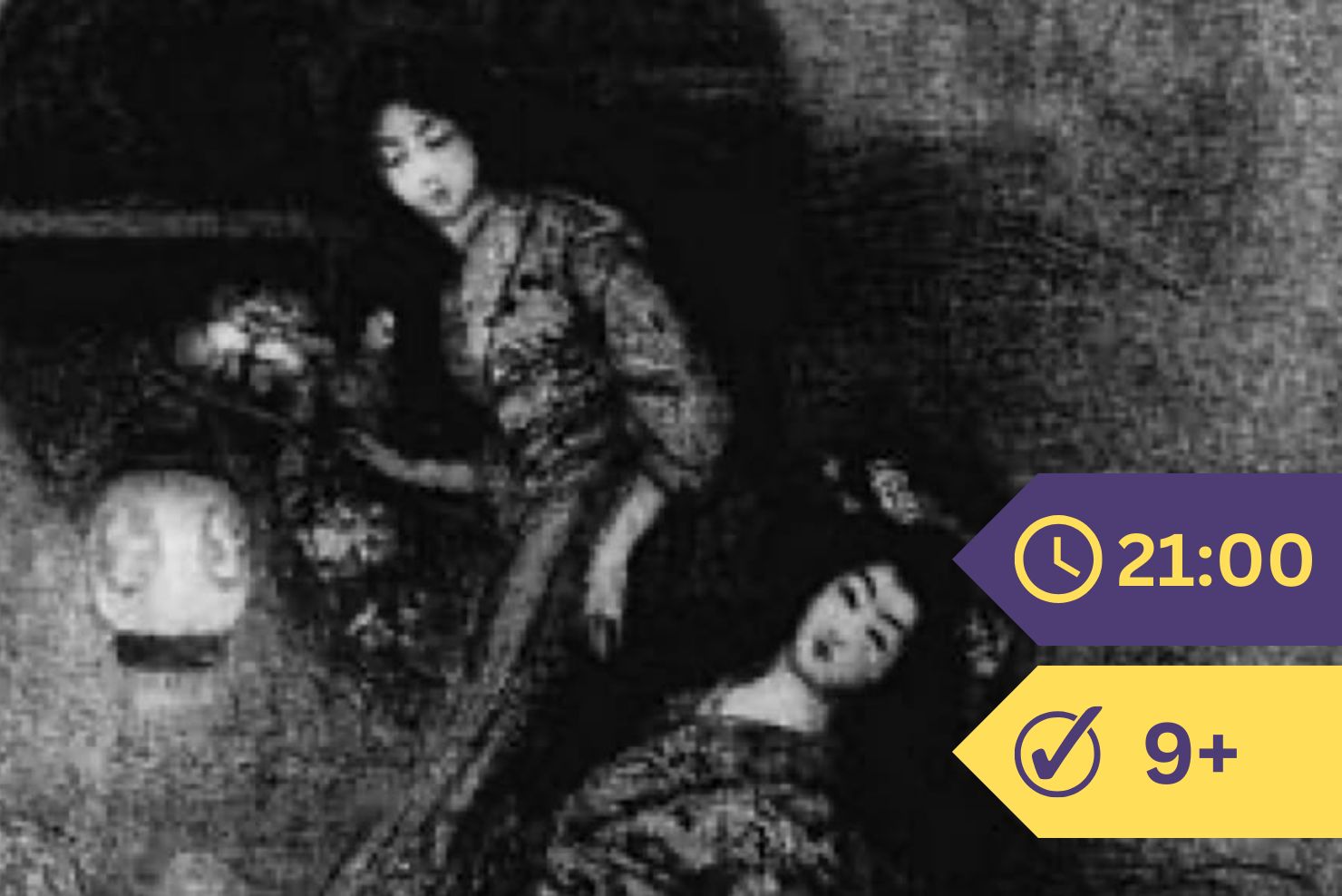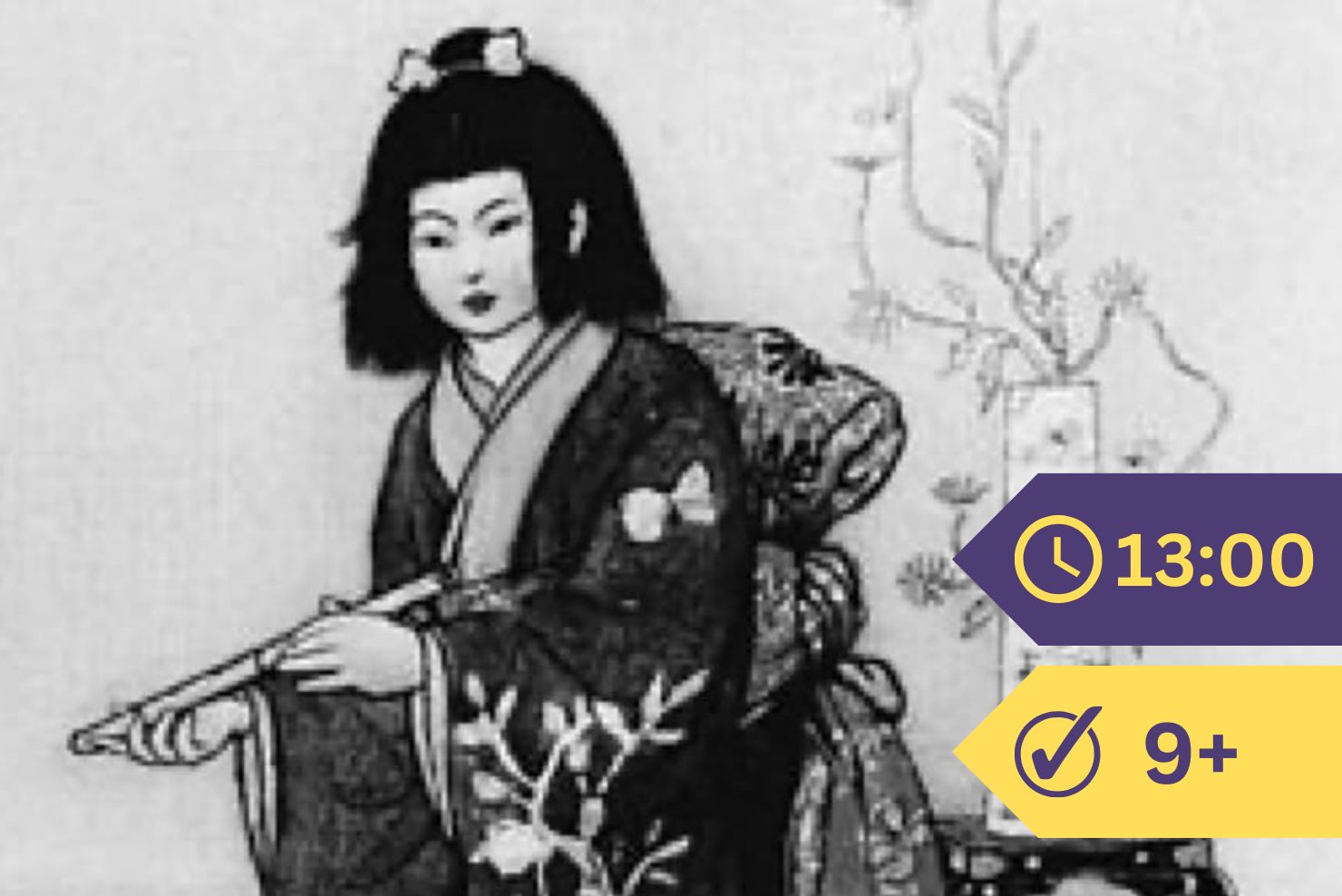Long ago, near Kyoto, the great city of the Young Men, there lived a honest couple. Their cottage stood in a lonely spot at the edge of a deep pine forest. People believed that the forest was haunted and said that it was full of nasty foxes. They also said that elves built their kitchens beneath the moss, and that the Long-nose Tengu held tea parties in the forest three times a month. And that the fairy children played hide-and-seek there every morning before seven o’clock.
Above all, they did not hesitate to say that the honest couple was eccentric, each in their own way. The woman was said to be a crazy old woman, and the man was said to be a wizard – which might well have been true. What was certain was that they did no harm to anyone, they were poorer than poor, and they had one honest daughter.
She was neat and pretty as a princess, and her manners were very refined. But she worked as hard as a boy in the rice fields; and inside the house she did all the housework. She washed and cooked and fetched water. She walked barefoot in a gray hand-woven dress, her hair tied up with a blue wisteria vine. She was brown and thin, but she was the happiest beggar girl ever, content with only a bed of moss and no supper.
Her good father died and the crazy wise old woman, who was her mother, became sicker every year. Soon she lay in a bed, in a corner of the house, waiting for her death. Her daughter sat beside her and wept bitter tears.
“My Child,” said the mother, “do you know that you are as beautiful as a princess?”
“Is that so?” asked the girl, still crying.
“Do you also know that you have excellent manners?” her mother said.
“Are my manners good?” asked the girl, still crying.
“You are my own dear Child,” said the mother, “but could you stop crying for a minute and listen to me?”
The girl stopped crying and laid her head next to her mother’s head on the pillow.
“Listen well,” said the mother, “so that you can remember it well later. It is a bad thing for a poor girl to be beautiful. If she is beautiful, lonely, and innocent, no one but the Gods will help her. They will help you, my poor child, but I have thought of another way. Bring me the big black rice bowl that is on the shelf.”
The girl took the bowl. “Look, now I will put the bowl on your head and all your beauty will be hidden.”

“But the bowl is heavy, Mother,” said the poor child.
“I will save you from what is even heavier to carry,” said the mother. “If you love me, promise me that you will not move the bowl until the time comes.”
“I promise, I promise really! But how will I know when the time has come?”
“You will know, my Child….and now help me outside, before the sweet morning dawn. I want to see the fairy children one more time as they run through the forest.”
So the child, with the black bowl on her head, took her mother in her arms and brought her to a grassy spot near the big trees. Soon they saw the fairy children, making their way between the dark trunks and playing hide-and-seek. Their light clothing fluttered, and they laughed lightly as they went on.
The mother smiled at them. And before seven o’clock she fell asleep, with a beautiful contented smile on her face.
When her small stock of rice ran out, the girl with the bowl on her head knew she had to find more or she would starve. First, she tended to the graves of her father and mother and poured water for the dead as was proper. Then she recited many holy texts.
Next, she tied on her sandals, lifted her skirts to reveal her scarlet petticoat, and wrapped her household gods in a blue printed handkerchief. The brave girl set out alone to try her luck.
Despite her slimness and pretty feet, she looked strange, as she would soon discover. The large black bowl covered her head and cast a shadow over her face. As she walked through a village, women washing clothes in the river looked at her. They cursed her and laughed loudly.
“She’s a boogeyman come to life,” said one.
“Away with her,” cried another, “what a shameless girl.”
“What false modesty to dare to wander the land with her head in a black bowl and to say to every passing man, ‘Come and see what’s hidden,'” they said. “That’s enough to make a healthy body sick.”
But the poor girl continued on. Sometimes children pelted her with mud and stones for fun. Sometimes she was roughly treated by villagers who mocked her and stepped on her dress as she passed by. They even put their hands on the bowl and tried to forcibly remove it from her head. But they only played that game once, as the bowl pricked them so venomously, as if it were a nettle, and the bullies ran away crying.
The beggar girl tried to find her luck, but it was very difficult. So she would have to ask for work, but would that work? No one wanted to hire a girl with a black bowl on her head.
Finally, on a beautiful day, she was so tired that she sat down on a stone. She cried as if her heart would break. Her tears rolled out from under the black bowl. They rolled down her cheeks to her white chin.
A wandering minstrel happened to come by, with his biwa (a Japanese guitar) slung over his back. He had a sharp eye and saw the tears on the girl’s white chin. That was the only part of her face he could see. “Oh girl with the black bowl on your head,” he quoted, “why are you sitting by the roadside crying?”
“I cry because life is hard. I’m hungry and tired… no one wants to give me money or work.”
“Well that’s really too bad,” said the minstrel. He meant it sincerely because he had a good heart.
“But I don’t have a single rin (a Japanese coin) myself, otherwise I would have gladly given it to you. I’m really sorry for you in all honesty.”
“In these circumstances, making a song for you is the only good thing I can do.”
So he did as he said. He spun his biwa around, drummed on it with his fingers, and easily made a song.
“For the tears on your white chin,” he said. And he sang:
“How white is the cherry blossom by the road, how black is the canopy of clouds! The wild cherry hangs by the roadside. Beware of the black canopy of clouds. Hear the rain, hear the sound of the rain. From the black canopy of clouds. Alas, the wild cherry, its sweet flowers are marred. Marred like the sweet flowers that are lost.”
“Sir, I don’t understand your song,” said the girl with the bowl on her head.
“Yet it is clear enough,” said the singer, and he left. He arrived at the house of a passing rich farmer. He went inside and they asked him to sing for the Master of the house.
“With all the good will in the world, I will do that,” said the singer. “I will sing a new song that I just made.” And he sang the song about the Wild Cherry and the Big Black Cloud.
When he was finished, the Master of the house said, “Tell us the meaning of this song.”
“With all the good will in the world, I will do that,” quoted the singer. “The Wild Cherry is the face of a girl that I saw sitting by the road. She was carrying a large black wooden bowl on her head. The bowl is the Big Black Cloud in my song. Her tears flowed from under the bowl like Rain, and I saw the tears drop on her white chin. She said she had to cry because of hunger and because no one would give her work or money.
“Let me help that poor girl with the bowl on her head,” said the Master of the house.
“Of course, if you wish,” quoted the singer. “She is sitting just a stone’s throw away from your gate.”
All of this eventually led to the girl being employed in the harvest fields of the rich farmer. She worked all day in the swaying rice, with her gray skirts tied together and her sleeves fastened with cords. She worked all day with a sickle while the bright sun shone on the black bowl. But she had food and a bed for the night. So she was content.
She saw the favor in the kind eyes of her Master. He kept her in the fields until the harvest was in. Then he took her into the house, where there was plenty for her to do, as his wife was often sick. So the girl lived, good and happy. She sang like a bird while she worked. Every evening she thanked the August gods for her great happiness. And she still wore the black bowl on her head.
When New Year came, the farmer’s wife said, “What a fuss, what a fuss, there must be scrubbing, cooking, and sewing, dear Maid, for we must make the house look its best.”
“That will certainly be taken care of, I will work on it with heart and soul,” said the girl and she went back to work immediately. “But Mistress,” she said, “if I may be so bold as to ask: ‘Is there a party or something like that?'”
“Indeed, we will give a party for many,” said the farmer’s wife. “My son, who is in Kyoto, the city of Young Men, will pay a visit to our house.”
Then the handsome Young Man came home. The neighbors were called and there was joy all around. They celebrated and danced, made jokes and sang, while they ate delicious red rice and drank plenty of good sake (which is a Japanese wine).
The girl with the bowl on her head, the Good Soul, modestly did her work in the kitchen, far away from the party, under the watchful eye of the farmer’s wife.
So it went on and on. But on a good day, the company asked for more wine. The wine was gone. So the Son of the house took the empty wine bottle and went to the kitchen himself. He expected to see everything, but not a girl, sitting on a pile of twigs, fanning the fire with a bamboo fan.
“In my life, I must and will see what is under that black bowl,” said the handsome young man to himself. And sure enough, he made it his daily task…he peeked at her as often as he could, which wasn’t very often. But it seemed to be enough for him. He no longer thought of Kyoto, the big city full of young men, he now stayed at home to court her. His father laughed, his mother grumbled, and the neighbors held their hands up in vain.
“Oh my dear Girl with the wooden bowl, you will be my Bride and no one else. I will have her,” shouted the impetuous, impatient young man. He quickly arranged the wedding day himself.
On the big day, young girls from the village came to adorn the Bride. They dressed her in a beautiful and expensive gown of white brocade with a hanging hakama (a Japanese garment) of scarlet silk. They hung a purple-blue cloak with gold on her shoulders.
The girls chattered away, but the Bride said nothing. She was sad because she had nothing to bring to her Groom and because his parents were displeased that he had chosen a beggar girl. She said nothing, but tears glistened on her white chin.
“Now away with that ugly old bowl,” said the girls. “It’s time to put golden combs in the Bride’s hair.” So they put their hands on the bowl to lift it, but they couldn’t budge it.
“Let’s try again,” they said. They pulled with all their might. But the bowl remained where it was. However, they heard frightening screams and moans.
“Oh, for Heaven’s sake, let it be,” said the poor Bride, “It gives me a headache.”
Now they had no choice but to present her to her Groom, exactly as she was.
“My dearest, I am not afraid of a wooden bowl,” said the young man.
So the sake was poured from a silver jug. Together they drank the mysterious Three-times-three sips from a silver cup. This made them man and wife. Then the black bowl exploded with a loud noise and fell to the ground in a thousand pieces. And with it, a rain of silver, gold, pearls, rubies, emeralds, and all conceivable jewels fell to the ground.
But the Bridegroom looked into the face of his Bride and said, “My dearest, there are no jewels that shine as beautifully as your eyes.”

